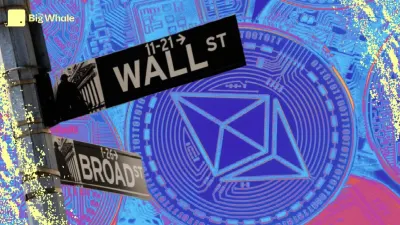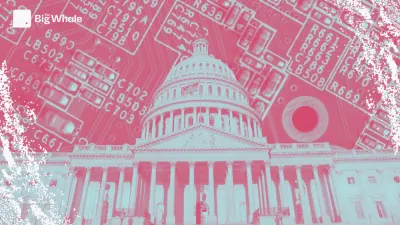The Big Whale: You arrived at Bercy 100 days ago. What are your first impressions? How is the start-up nation faring?
Jean-Noël Barrot: What I see is that in just a few years, under the impetus of the President of the Republic and my predecessors, France has become a great digital and start-up nation. One of the best symbols of this is that we have succeeded in bringing about the emergence of many unicorns (companies worth more than €1 billion, editor's note).
In 2017, there were just 3 and today there are 27. And more are on the way. Beyond the number of unicorns, French start-ups have never raised so much. In October, fundraising had already exceeded the 2021 level, which was already a record! All this is no accident, but the result of a very ambitious policy from an industrial and financial point of view.
And this policy doesn't just affect Paris, the whole country is benefiting. Ledger is a very good example of this : they have achieved something quite extraordinary with their plant in Vierzon, which is contributing to the dynamism of a region that badly needed it. We see every day that Tech can revitalise regions, and many other industrial start-ups are arriving. So we need to continue along this path and take the right turns.
French Tech is doing well. But isn't the economic context, with fears of recession, a threat?
Many start-ups remain fragile. We are keeping a close eye on them. This summer, we interviewed all the companies in the Next40 and FT120 to find out about their financial situation, and the feedback was fairly reassuring. Many of them raised funds before the macro-economic context showed signs of slowing down, but we're going to monitor the situation carefully.
In contrast to your predecessors, you're a Minister Delegate, not Secretary of State? Is this a form of promotion for digital technology?
This clearly shows the government's commitment to this issue. To maintain its position as an innovative technological powerhouse, France needs to remain strong on 3 fronts: firstly, innovation. We need to support the development of start-ups and tech players in all areas (5G, quantum, deeptech, artificial intelligence and of course crypto and Web3). More broadly, we also need to encourage innovation in the fields of healthcare and decarbonisation, where digital technology can be a real lever for transformation. And to continue innovating, we need to develop talent. We want to train 400,000 digital professionals over the five-year period, which is an essential lever.
The second thing is obviously regulation and protection. There is a very strong demand from our fellow citizens. We have already made progress with the DMA (Digital Markets Act) and DSA (Digital Services Act), which will impose sound and fair rules in the digital space. Other important texts are still being negotiated at European level. And finally, we need to make digital technology accessible to everyone, and in particular to those French people who are furthest away from it, while taking care to control the environmental impact of digital technology.
Since your arrival at Bercy, you have already spoken out several times on the subject of cryptos and Web3. Why?
It's a major issue because the web is going to undergo a third metamorphosis and Europe has the opportunity to become a leader, something it failed to do with Web2 (on the mobile and social part). This is a challenge both for capturing the value that will be created in the future by Web3 and its applications, and also for traditional players, particularly in sectors such as culture, video games and luxury goods, where we are world leaders. It's also an issue of sovereignty, because Web3 will provide decisive new technological building blocks for the digital future.
You're in contact with players like Binance, Cryptocom and, more recently, the head of Elrond. Is this a sign?
Our ambition is clear: we want to master the technological building blocks of Web3 so that we are not dependent on foreign powers because technological domination precedes economic and cultural domination.
We are convinced that, in this revolution, we have a head start in making France a global hub. There are uses for crypto-assets in which we want to have a strong presence, particularly DeFi (decentralised finance) and NFTs (non-fungible tokens). Over the past 5 years, we have already shown that we can be pioneers with the PSAN, which provides a flexible framework for platforms while protecting consumers. This framework inspired the European regulation that will come into force in 2024. And we are indeed pleased to see global giants setting up shop in France.
For the moment, these are just registrations and not approvals...
Everything in its own time. Companies will move from registration to accreditation in the coming months if they so wish. The fact that there are already 50 registrations is a strong signal. From now on, we need to prepare for PSAN approval in the run-up to the entry into force of MiCA.
What assessment can be made of PSAN? Leading figures such as Aurore Lalucq MEP and Nicolas Dufrêne, President of the Institut Rousseau, have criticised it for being a mere registration that does not provide much of a framework...
Let's not confuse registration with approval. What I can tell you is that when we negotiated this status in Parliament, there were a lot of discussions with industry players, regulators and supervisors.
That being said, when we talk about subjects like cryptos, which are totally new, we have to be careful not to prevent innovation. We obviously need to protect and provide a framework, but we also need to allow innovation. That's why MiCA will be rolled out progressively and adaptably.
Do you think the taxation of cryptos needs to be improved? It's still complicated to declare your income...
Yes, and as Bruno Le Maire has announced, we will conduct a general review during 2023 to define whether further adjustments to tax legislation are necessary.
The MiCA regulation has just been adopted by the European Parliament. Many players are worried about the consequences of this regulation, which could favour the biggest players, and therefore the Americans. Do you understand these fears?
This is an intrinsic difficulty of regulation. We saw this with the RGPD, which sometimes discouraged certain emerging players. The gamble we are taking is that regulation will enable the creation of a global market on the scale of the European Union. The aim is for all companies, existing and new, to be able to develop within a clear framework. The same is true of the DMA, which reinstates competition rules in the digital space to enable European players to develop in the cloud, for example.
In the field of crypto-assets, it's the same thing. If we want a unified economic area, we need a harmonised legal framework. This is a huge opportunity for European players.
But you know very well that it's the biggest players who do best in the big markets...
We want the markets to remain "contestable", as we say in economics. Our aim is neither to favour tech giants like Google and Meta, nor to dismantle them. We want to see healthy and fair competition in all digital markets.
Our ambition is to regulate digital spaces, but in an intelligent way. There is something very paradoxical about saying that Europe is not a single market, that there are obstacles, and when we take steps to create this market, we say that it will serve American or Chinese interests...
France has some world champions in Web3. Ledger is the world leader in digital asset custody, Sorare in NFT gaming and Kaiko in crypto data analysis. How do you explain such success? And how can we accelerate the movement?
Yes, we already have world leaders in these areas. So how do you explain this? There are several reasons. Firstly, French entrepreneurial genius. And in France, and more broadly in Europe, we also have the know-how to be at the cutting edge of innovation. France has real expertise in cryptography, smart cards... It's not surprising that Ledger and Sorare are French. France is a land of entrepreneurs and will remain so.
You're talking about Sorare, of course. You know that the company is in the sights of the authorities, particularly over the nature of their business, which could be considered gambling. What is your position?
NFTs, like cryptos a few years ago, are a new object that raises legitimate questions. But we must not place ourselves in the camp of fear, but in that of ambition.
NFTs are bringing about a real revolution and will impact many sectors, such as video games for example, in France and around the world. When it comes to certain uses like Sorare, we need to be agile. This is fundamental if we don't want to stifle innovation. So we need to find ways for innovation to develop while protecting users against certain risks, in particular addiction and money laundering.
We've managed to do this with cryptos and we're going to do it, by the end of the year, with NFTs. That's why Bruno Le Maire and Gabriel Attal and I have just appointed the Inspectorate General of Finance to carry out a comprehensive review of NFTs. In particular, it will draw up an overview of uses and could propose ways of changing the regulations to enable players in the sector to develop.
You are going to clarify the status of NFTs?
Yes, we are going to work so that players in the sector can develop.
You have seen that EDF, through its subsidiary Exaion, is an Ethereum protocol validator. What do you think? Is it a good thing?
More generally, I think it's important for France and Europe to be involved in infrastructures like Ethereum. We need to be contributors so that we don't let nodes and blockchains develop far from our area of influence. Blockchains are the infrastructure of tomorrow's Internet. It is our duty to be present. So I think EDF's investment is welcome.
And what about Bitcoin? Should EDF and the French government take a position?
It's not for me to decide this question. A number of protocols still consume a lot of energy. Ethereum has made a considerable step forward with The Merge reducing its consumption by more than 99% . I believe that there will only be sustainability for cryptos and Web3 if environmental issues are also taken into account.
Despite the Pacte law and the government's rhetoric, many crypto companies are still struggling to find banks. What can be done to improve things?
There is a convincing job to be done as the ecosystem matures. I'm pleased to see that some banks are getting on board. This is the case for Société Générale with its dedicated crypto subsidiary, Forge, and I hope that others will follow suit and support the crypto ecosystem.
Heading 1 Heading 2 Heading 3 Heading 4 Heading 5 Heading 6 Lorem ipsum dolor sit amet, consectetur adipiscing elit, sed do eiusmod tempor incididunt ut labore et dolore magna aliqua. Ut enim ad minim veniam, quis nostrud exercitation ullamco laboris nisi ut aliquip ex ea commodo consequat. Duis aute irure dolor in reprehenderit in voluptate velit esse cillum dolore eu fugiat nulla pariatur.
Block quote Ordered list
Item 1 Item 2 Item 3 Unordered list
Text link
Bold text
Emphasis
Superscript
Subscript





